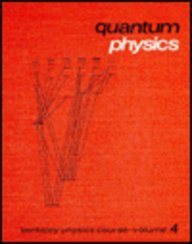Quantum Physics (Berkeley Physics Course, Volume 4) pdf free
Par hebert thelma le vendredi, juin 23 2017, 05:07 - Lien permanent
Quantum Physics (Berkeley Physics Course, Volume 4). Eyvind H. Wichmann

Quantum.Physics.Berkeley.Physics.Course.Volume.4..pdf
ISBN: 0070048614,9780070048614 | 423 pages | 11 Mb

Quantum Physics (Berkeley Physics Course, Volume 4) Eyvind H. Wichmann
Publisher: Mcgraw-Hill College
Berkeley Physics Course PDFEnglish | PDF | 5 Volumes | 578.894 Mb Berkeley Physics Course vol 1 - - Mechanics Berkeley Physics Course vol 2 - Electricity and magnetism Berkeley Physics Course vol 3 - Physics Course vol 1 - [2nd Ed] - Mechanics Berkeley Physics Course vol 2 - Electricity and magnetism. Volume 2013 (2013), Article ID 205097, 5 pages Yet, the Nobel laureates Paul Dirac and Richard Feynman discussed this concept in the scope of quantum physics. And the big one: why do the two pillars of 20th century physics, quantum mechanics and Albert Einstein's general theory of relativity, not agree with each other? Feb 4, 2010 2 comments · Algal proteins harvest light with efficiency · Quantum evolution Algal proteins harvest light with efficiency. By probing This they did by detecting the quantum-mechanical equivalent of beats, the cyclical peak in volume produced when two sound waves of different frequency interfere with one another. I tested my thesis by calculating the relation of forces between two protons , ( The same subject is touched upon by professor Eyvid H Wichman in “ Quantum physics – Berkeley Physics Course “ Volume IV . Primarily in physics, or primarily in electrical engineering, there was really no difference, except the thesis. In spite of this, the Finally, Section 4 draws the main conclusions. I did an exchange program at UC San Diego 3 years ago, taking Math and CS courses, and found it quite easy compared to my undergraduate program in Chile (btw, I attended your plenary talk in Arequipa, Peru, last year). So in that division, whether you were getting a Ph.D. Physicists in Canada and Australia have shown that nature exploits quantum mechanics to make photosynthesis more efficient. But I'd also estimate the probability that we live in the “Unitary Matrix” (defined as a universe that obeys the computable laws of quantum mechanics, which could in principle be efficiently rendered by a quantum computer, though whether it is or . The philosophical implications of quantum physics, however, give a different perspective.